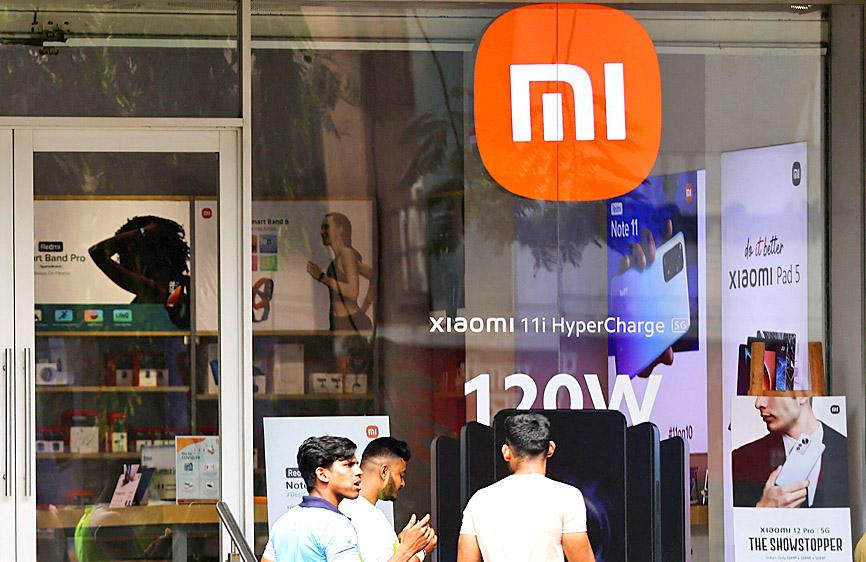A lobby group including Apple Inc and other technology giants operating in India have called out the country’s authorities for misunderstanding how patent fees work, following local officials’ dispute with Xiaomi Corp (小米).
In a letter sent to ministries on Monday, the India Cellular and Electronics Association (ICEA) urged the government to intervene and accused the country’s enforcement agencies of a “lack of understanding” of royalty payments in the technology industry.
The Indian agency that combats money laundering is accusing Xiaomi of moving money out of the country by falsely claiming it was for patent fee payments. The agency seized more than US$700 million from a local unit of the Chinese smartphone maker in April, a move that has since been put on hold pending a final court decision.

Photo: Reuters
While the lobby group’s letter did not name the Xiaomi case specifically, it said that accusing companies of illegal royalty payments could have a “chilling effect” on business in the country.
The risk for the other companies is that Indian authorities apply similar interpretations of royalty payments to other tech firms.
Xiaomi is a member of the ICEA, as are rivals including China’s Oppo Mobile Telecommunications Corp (歐珀) and homegrown firm Lava International, as well as Apple and its Taiwan suppliers Hon Hai Precision Industry Co (鴻海精密) and Wistron Corp (緯創).
Xiaomi has disputed India’s asset seizure, saying that its patent fee payments are justified and its statements to financial institutions have been accurate.
Indian authorities said Xiaomi’s local unit remitted money to three foreign-based entities with ties to Xiaomi, masking them as royalty payments.
Enforcement authorities have taken “a stance that royalty is a simple way to take money out of India,” ICEA said in its letter, addressed to the federal finance, trade and tech ministers, and seen by Bloomberg News.
“We appreciate that it is the duty of agencies to identify malpractice in India, but in this case, they are not well-briefed. Patent implementers are doubly embattled, paying onerous royalty on one side, and facing and fearing enforcement actions on the other,” the lobby group said.
Xiaomi has said that it is being targeted because it is Chinese, insisting that the payments abroad were royalty remittances for using patented technology.
Companies worldwide pay billions of US dollars in such fees annually for using each others’ intellectual property.
Tax raids on Xiaomi and allegations of money laundering have dented the company’s brand image in the country where it is the top seller of smartphones, but the dispute over what counts as royalties could have implications on other smartphone and electronics companies with operations in India.
India is also probing the local units of China’s ZTE Corp (中興通訊) and Vivo Mobile Communications Co (維沃) for alleged financial improprieties, Bloomberg News reported this week.

INVESTMENT: Jun Seki, chief strategy officer for Hon Hai’s EV arm, and his team are currently in talks in France with Renault, Nissan’s 36 percent shareholder Hon Hai Precision Industry Co (鴻海精密), the iPhone maker known as Foxconn Technology Group (富士康科技集團) internationally, is in talks with Nissan Motor Co’s biggest shareholder Renault SA about its willingness to sell its shares in the Japanese automaker, the Central News Agency (CNA) said, citing people it did not identify. Nissan and fellow Japanese automaker, Honda Motor Co, are exploring a merger that would create a rival to Toyota Motor Corp in Japan and better position the combined company to face competitive challenges around the world, people familiar with the matter said on Wednesday. However, one potential spanner in the works is

SEMICONDUCTORS: Samsung and Texas Instruments would receive US$4.75 billion and US$1.6 billion respectively to build one chip factory in Utah and two in Texas Samsung Electronics Co and Texas Instruments Inc completed final agreements to get billions of US dollars of government support for new semiconductor plants in the US, cementing a major piece of US President Joe Biden administration’s CHIPS and Science Act initiative. Under binding agreements unveiled Friday, Samsung would get as much as US$4.75 billion in funding, while Texas Instruments stands to receive US$1.6 billion — money that would help them build facilities in Texas and Utah. The final deals mean the chipmakers can begin collecting the funding when their projects hit certain benchmarks. Though the terms of Texas Instruments’ final agreement is

Call it an antidote to fast fashion: Japanese jeans hand-dyed with natural indigo and weaved on a clackety vintage loom, then sold at a premium to global denim connoisseurs. Unlike their mass-produced cousins, the tough garments crafted at the small Momotaro Jeans factory in southwest Japan are designed to be worn for decades, and come with a lifetime repair warranty. On site, Yoshiharu Okamoto gently dips cotton strings into a tub of deep blue liquid, which stains his hands and nails as he repeats the process. The cotton is imported from Zimbabwe, but the natural indigo they use is harvested in Japan —

Honda Motor Co absorbing Nissan Motor Co could give the two struggling Japanese brands the scale they need to take on China’s BYD Co (比亞迪), sales figures released yesterday showed. Honda, which earlier this week sketched out plans for a deal that amounts to an acquisition of Nissan, sold 3.43 million cars globally in the first 11 months of this year. Nissan said it sold just over 3 million. China’s biggest automaker BYD sold 3.76 million vehicles over the same period — a clear illustration of how Nissan and Honda are weak alone, but together might have a fighting chance. Honda and Nissan